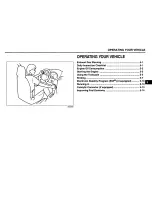
Engine Belts, Tires
Engine Belts
Check the condition of the two
engine belts. Examine the edges of
each belt for cracks or fraying.
Check the tension of each belt by
pushing on it with your thumb
midway between the pulleys.
The belts should have the following
"play" or deflection.
Alternator belt:
(With air conditioning)
10.0 —12.0 mm (0.39 — 0.47 in)
(Without air conditioning)
10.5 — 12.5 mm (0.41 — 0.49 in)
Power steering belt:
13.5 — 16.5 mm (0.53 — 0.65 in)
If you see signs of wear or loose-
ness, have your dealer adjust or
replace the belts.
Tires
Check the inflation and condition
of your car's tires at least once a
month.
Inflation
Check the pressure in the tires
when they are cold. This means the
car has been parked for at least
three hours. If you have to drive
the car before checking the tire
pressure, the tires can still be
considered "cold" if you drive less
than 1.6 km (1 mile).
If you check the pressure when the
tires are hot (the car has been
driven several miles), you will see
readings 28 to 41 kPa (0.3 to 0.4
kg/cm
2
,4 to 6 psi) higher than the
cold reading. This is normal. Do not
let air out to match the specified
cold pressure. The tire will be
underinflated.
Maintenance
POWER STEERING BELT
ALTERNATOR
BELT
Main Menu
Table of Contents
▲
▼
















































